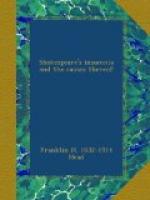In the “Comedy of Errors,” the Abbess says to Adriana:—
“The venom clamors of a jealous
woman
Poison more deadly than a mud dog’s tooth.
It seems his sleep was hindered by thy railing.
* * * * *
In food, in sport, and life-preserving rest
To be disturbed, would mad or man or beast.
The consequence is, then, thy jealous fits
Have scared thy husband from the use of wits.”
Note, too, the kindred thought:—
“Love hath chased sleep from my enthralled eyes.”
And again this passage, called forth possibly by the
letters of the
Rev. Walter Blaise:—
“Slander,
Whose edge is sharper than the sword;
whose tongue
Outvenoms all the worms of Nile; whose
breath
Rides on the posting winds and doth belie
All corners of the world.”
As also this:—
“Do not, as some ungracious pastors
do,
Show me the steep and thorny way to heaven,
Whiles, like a puffed and reckless libertine,
Himself the primrose path of dalliance
treads,
And recks not his own rede.”
From these several letters sufficiently appear the causes for the insomnia of Shakespeare, which are some of the same causes resulting in its prevalence to-day. They illustrate anew that history repeats itself forever; that humanity is always the same; that like temptations and errors come to men with like results in all the centuries; that the sleeplessness of Shakespeare came, because, merely as a matter of form, he had indorsed for a friend,—because he had bought more stocks than he could pay for, and when his margins were absorbed, came forth a shorn and shivering lamb,—because of the turbulence of labor,—because, alas! he too had been dazzled and bewildered by
“The light that lies
In woman’s eyes.”
Marvellous as were the endowments of the master, yet was he human and as one of us.
Chicago, 1886.



